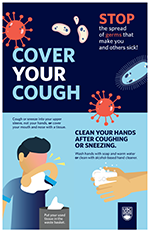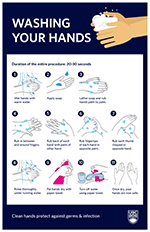Having the knowledge, plans, and supplies you need to react appropriately to any and all emergencies will not only contribute to our community’s overall ability to respond and recover, but it will also give you a sense of assurance in a time of crisis. To further minimize the impacts of an emergency on students, faculty, staff, visitors, infrastructure, and the environment, we recommend practising your response so you’re not just prepared, but prepared to act.
Menu
Active threat
Bomb threat
Earthquake
Extreme weather
Fire
Hazmat
Pandemic
Shelter-in-place
Suspicious object
Active threat
An active shooter is a person actively shooting at people, usually at random, in a confined or populated area. In most cases, there is no pattern or method to their actions. Event is unpredictable and evolves quickly. Knowing what to do can save lives.
When an active shooter is in your vicinity, you must be prepared both mentally and physically to deal with the situation. If faced with an active shooter incident either on UBC campus or elsewhere, you have THREE options to protect your personal safety immediately — RUN, HIDE, FIGHT.
For updates in the event of an incident occurring, refer to www.ubc.ca.
Run, Hide, Fight
Run (get out)
If you see or hear an armed intruder and if you believe it is possible to safely exit the area — RUN!
- Leave belongings behind.
- Advise others to leave.
- Assist others if you can.
- Warn others of the threat.
- Call police — 911, as soon as it is safe to do so.
Hide (hide out)
If you don’t know exactly where the shooting is happening or evacuation is not possible to escape safely — HIDE!
- Take shelter if you are inside a classroom or office, stay there. If you are in a corridor, go to the closest room that’s not already locked.
- Lock windows and doors, refer to any lockdown procedures posted in the room and await instructions from emergency personnel.
- Barricade the entry if the door does not lock. Use tables and chairs.
- Close curtains and blinds.
- Turn off the lights.
- Keep quiet. Put your cell phone on silent mode — including the vibrate feature.
- Hide behind large objects if possible.
- Stay low and keep away from windows and doors.
- Remain calm and await further instructions from emergency personnel.
- Call 911if safe to do so.
- If the fire alarm is activated, remain where you are and await further instructions from emergency personnel.
- Do not open the door for anyone unless they validate their identity as an emergency personnel.
Fight/Defend (take out)
As an absolute last resort if you cannot run or hide, and if you feel your life is in imminent danger — FIGHT!
- Commit to your actions with the goal being to delay, block, or overcome the threat.
- Work with the people around you.
- Do what you need to stay alive, including using force to protect yourself.
- Look for objects that could be used as tools for self-defence.
When police arrive
- Remain calm and follow instructions.
- Drop items in your hands (i.e. bags, jackets).
- Keep hands raised (spread fingers) and visible at all times.
- Avoid quick movements toward officers, such as holding on to them for safety.
- Avoid pointing, screaming or yelling.
- Do not ask questions when evacuating.
The first officers to arrive on scene are tasked to end the incident, and they may not stop to help the injured. Know that rescue teams will enter after the initial officers. These rescue teams will treat and remove the injured once it is safe to do so.
Once you have reached a safe location, you will likely be held in that area by police until the situation is under control and all witnesses have been identified and questioned. Do not leave the area until police have instructed you to do so.
Information to 911 operators
- Location of the active shooter.
- Your location.
- Number of shooter(s).
- Physical description of shooter(s).
- Number and type of weapons held by the shooter(s).
- Number of potential victims at location.
Emergency preparedness training
UBC offers a variety of Emergency Preparedness training workshops, including specific Active Shooter Preparedness online training. The courses are offered on-line (CWL login required), or in a small group setting. The training will allow you to have the opportunity to learn more about active shooter situations and UBC’s approach to maximizing campus safety.
^ Back to Top
Bomb threat
All threats must be taken seriously and handled as though an explosive device is on campus. If you receive a bomb threat, contact the RCMP (911) immediately, and then campus security (604-822-2222). In the case of an explosion, get out of the building as quickly and calmly as possible.
What to do?
Bomb threats can be received by telephone, letter or email. If you receive a bomb threat by telephone, stay calm and try to get as much information as possible. Although this might be difficult, try to note any unique features about the voice and any background sounds you hear over the telephone. Keep the caller on the line as long as possible and take detailed notes about what is said. Do not upset the caller. Indicate your willingness to cooperate.
Take notes on everything said and on your observations:
- Time the call was received.
- Telephone number on which the call was received.
- Exact words of the person making the call (including location of bomb and any time factor involved).
- Noises (listen for any background noises including traffic, music, etc.).
Try to gather as much information as possible:
- Where is the bomb?
- When is the bomb going to explode?
- What kind is it?
- What does it look like?
- Permit the caller to say as much as possible without interruption.
Be aware of the caller’s:
- Voice (child or adult, male or female, accent, whether or not the voice is familiar.
- Estimated age.
- State of mind (are they calm? agitated? angry? crying?).
- Any accent or distinguishing characteristics
What to do after?
Call RCMP — 911 immediately, and then UBC Campus Security to report the threat. If possible, get a co-worker to do this while you continue talking to the caller. (The purpose of keeping the person talking is to assist in identifying the caller. Tracing is not always possible.)
- Survey your immediate work area. If you see a package or a foreign object in an unusual place — DON’T TOUCH IT.
- Follow instructions given by emergency personnel. You will be advised if evacuation is necessary.
- An explosion of any type must be reported immediately to the Fire Department. Call 911.
Earthquake
Before an Earthquake
- Avoid storing heavy objects on high shelves.
- Secure bookcases, cabinets, and equipment.
- Install restraints on laboratory shelves and store glass cylinders in properly designed racks.
- Be familiar with emergency plans and procedures.
- Have an emergency kit at home, in the office, and in your car.
- Practise earthquake response often and participate in annual earthquake drills, such as ShakeOut BC.
During an Earthquake
Drop, Cover, and Hold On, and stay in this position for at least 60 seconds. If you are inside, stay inside until the shaking stops. Do not run outside or to other rooms during the shaking.
If indoors or in a classroom
- Drop down on your hands and knees to protect you from falling — an earthquake can knock you down. Keep clear of windows that could break and large objects that could fall over.
- Cover your head and neck, or your whole body if you can, under a sturdy table. If you can’t get under something strong, or if you are in a hallway, crouch against an interior wall and protect your head and neck with your arms.
- Hold on will help keep you safe during a big earthquake until the shaking stops — you might have to move with it if the shaking shifts it around. Wait 60 seconds after the shaking stops
- Expect fire alarm and sprinkler systems to activate. Do not evacuate until the shaking has stopped.
- When evacuating, be careful and watch for falling debris.
- Proceed to the designated assembly area
If you have mobility challenges or in a wheelchair
- If you can, follow the Drop, Cover, Hold on procedure.
- If you are in a wheelchair, move to an inner wall if safe to do so. Lock the brakes and cover your head with your arms.
- If available use a blanket or pillow to shield your face from falling debris/glass.
- When the shaking stops move to refuge areas. If your building doesn’t have a refuge area find a safe location to shelter-in-place until assistance arrives.
If you are outside
- Stay outside.
- Find a clear spot away from buildings, trees, streetlights, and power lines, then Drop, Cover and Hold on.
- Move to an open area away from buildings, trees, glass, streetlights, and power lines, then Drop, Cover and Hold on.
- Do not enter any buildings until they have been approved for re-entry.
If you are in transit
- In a car — Pull over to a clear location, stop and stay there with your seat belt fastened until the shaking stops. Avoid overhead structures (i.e. bridges and overpasses). Set the parking brake and stay inside.
- On a bus — Stay seated until the bus stops. Sit in a crouched position and protect your head from falling debris. Stay inside if it is safe.
AVOID the following in an earthquake
- Doorways — Doors may slam shut and cause injuries.
- Windows, bookcases, tall furniture and light fixtures. You could be hurt by shattered glass or heavy objects.
- Elevators — If you are in an elevator during an earthquake, hit the button for every floor and get out as soon as you can.
- Downed power lines — Stay at least 10 metres away to avoid injury.
- Coastline — Earthquakes can trigger large ocean waves called tsunamis.
After an Earthquake
- Stay calm, help others if you are able and be prepared for aftershocks.
- Assess your immediate surroundings for dangers, especially broken glass.
- If you are able to remain inside, assess the evacuation route and muster area for potential risks, e.g., falling debris or exposed electrical wires, before proceeding out of the building.
- If you have to leave your area, take your emergency kit and other essential items with you and proceed to an evacuation route.
- Once you exit the building, go directly to your building’s designated assembly area. If you have difficulty negotiating the stairs, or if you need assistance in evacuating, go to the designated area of refuge if your building has one.
- Be prepared for aftershocks! Repeat Drop, Cover, and Hold On each time you experience any shaking.
- Do not re-enter evacuated buildings until cleared to do so by emergency personnel.
- Don’t tie up phone lines, if it’s not a life-threatening emergency, use text messages and social media.
- Don’t drink water from sinks or taps — All plumbed water must be boiled after an earthquake.
- Follow instructions of first responders and campus response personnel — they will direct you to safety and to emergency resources.
For information on what to do after an earthquake, visit Post Emergency.
Extreme weather
The weather at UBC can be unpredictable—as UBC has it’s own micro-climate which can be quite different from lower-lying areas.
Each department is responsible for setting their own policies and expectations with faculty and staff as it relates to attendance during extreme weather events.
In extreme weather situations, updates on campus conditions, classes or exams are available on https://ubc.ca.
Extreme Heat
Rising temperatures can cause serious health and safety implications. Your body has to work harder to maintain its normal optimal temperature on hot, humid days. Heat exhaustion and heat stroke are serious but preventable heat-related illnesses caused by high temperatures. In addition, hot temperatures can worsen pre-existing health conditions.
Learn more on the Weather and Thermal Stress Safety.
Heat Warnings
If Environment and Climate Change Canada issues a heat warning, take additional steps to stay safe. Identify those at risk, make plans, and prepare your home. Be sure you are ready: Extreme Heat Preparedness Guide.
Indoor temperatures can rise significantly during the day. Make plans for you and your loved ones to stay cool during the day by seeking shade outdoors or at a cooling center near you. Don’t forget to look after your pets.
If a heat warning has been issued, click here to find a list of on-campus UBC Cooling Centers.
Visit your First Nation or local authority website for additional information, guidance and cooling centers location: Musqueam Indian Band, City of Vancouver, City of Richmond, City of Burnaby, City of Surrey, City of New Westminster, City of North Vancouver, City of Coquitlam, City of Port Coquitlam, City of Port Moody, City of Delta, City of Langley.
*Please note: Not all neighbouring First Nation or Local Authority websites are listed above.
Extreme Heat Emergency
If an extreme heat emergency is declared, it is important that you have a personal emergency plan. Pay attention to the information from your local authority and trusted sources.
Snowstorm
UBC Facilities is responsible for managing ice prevention and snow removal on the Vancouver campus. They monitor custom weather feeds to get accurate predictions of what’s coming and work hard to make the campus as safe as possible as soon as possible. Municipal Services’ fleet of snow removal and deicing vehicles start early in the morning to plow and treat as many roads as possible before the first students, faculty, and staff arrive.
The Campus Snow and Ice Management Plan allow crews to prioritize work in order to ensure the highest risk areas of campus are open first — places such as the bus loop, hospital, daycares, and arterial roads — before moving onto major pedestrian routes and academic areas, followed by other campus roads. For more information on ice prevention and snow removal, visit UBC Facilities.
As per the Snow Policy, if UBC is subject to extreme winter weather conditions, the administration may decide to cancel or reschedule classes and/or curtail non-essential services. You are advised to check https://www.ubc.ca in the event of extreme weather for updates.
We recommend UBC students, faculty, staff and campus visitors to also download the UBC Safe Vancouver app and turn on your push notifications to receive immediate information (e.g. weather advisories, class cancellations, etc.) and updates that are impacting the entire campus.
For information on UBC’s winter weather protocols for faculty & staff, visit Human Resources.
Tips to help you stay upright during the winter season
Adjust your gait — Shorten your stride length to keep your centre of gravity supported. Also, walk with your knees slightly bent, as locking your knees reduces your ability to adjust to a slip. When turning to avoid sharp turns.
Slow down — Take slow, deliberate steps and be on the lookout for icy spots. Place your whole foot down at once, shifting your weight slowly to this foot before stepping with the other foot.
Balance your load — Consider donning a backpack. Backpacks keep your load closer to your centre of gravity. Carrying heavy items in your hands hinders your arms’ ability to provide balance when you do slip. You need your arms free to help you recover your balance if you start to slide. Do not walk with your hands in your pockets for this very same reason.
Wear appropriate footwear — Footwear with a thick rubber or non-slip sole is recommended. Avoid wearing heels and footwear with minimal tread.
Entering/exiting your vehicle — Take care when stepping into/out of your car as you are usually off balance and on only one foot. This increases your chance of slipping. Consider carrying a bag of sand in your vehicle that you can sprinkle on the ground before exiting the vehicle.
Snow-covered curbs — Exercise caution around snow-covered curbs on paths and roadways.
Entering/exiting buildings — Entrance ways may be slippery, exercise caution and report any missing floor mats to UBC Facilities.
Snow removal equipment — Our winter equipment is fully operational during early morning & daytime hours whenever a snowfall occurs. We are requesting staff and students be aware of moving equipment and be cognisant of the potential risk for pedestrians walking in front of and/or behind operating equipment.
Windstorm
High winds can happen without warning and in any season. High winds can blow down trees and branches and cause power outages, road closures, and traffic disruptions. Be prepared to be without power by developing an emergency plan, and putting together your emergency kit.
- Stay safe, warm, dry and calm.
- Avoid driving.
- Go out only if you have to. If you must, dress warmly to prevent frostbite and hypothermia.
Power Outage
A power outage is a short or long-term loss of electric power to an area. During an extended power outage, you may be without light, heat and hot water. Most power outages will be over almost as soon as they begin, but some can last much longer — up to days or even weeks. Power outages are often caused by freezing rain, sleet storms and/or high winds which damage power lines and equipment. Cold snaps or heat waves can also overload the electric power system.
- Carefully exit the impacted area.
- If safe to do so, secure any equipment or materials you are working with before leaving the area (i.e. unplug electrical equipment and turn off computers).
- Follow emergency lighting to guide you to exits.
- Use the stairs carefully. Elevators will be unavailable.
For more information on electrical power at UBC, visit UBC Facilities.
^ Back to Top
Fire
Interface Fire
Nearly half of all wildfires in B.C. are caused by human carelessness. You can prevent them by following a few guidelines:
- Mind your sources of ignition — cigarettes, lighters, matches, power equipment, BBQs, campfires, etc.
- If you are concerned about building or landscape sources of ignition, e.g., clogged leaves, deadwood on nearby trees, or forest litter too close to your space at UBC, put in a service request with Building Operations or contact the Service Centre (604-822-2173) to report fire hazards or safety risks.
- If you are concerned that someone’s behaviour is causing a fire risk call campus security (604-822-2222) or 911.
- Check for bans and restrictions.
- Camp and BBQ responsibly.
- Call 1-800-663-5555 or *5555 on your cell phone if you spot smoke, flames, or an unattended campfire.
Wildfire Smoke
In the event of a wildfire, the best way to protect yourself is to reduce exposure.
- Stay indoors and keep the air clean (windows/doors closed, no vacuuming).
- When in a vehicle, keep windows closed with air conditioning set to recirculate.
- Reduce time spent outdoors and avoid vigorous outdoor activities.
- Visit places with controlled air supply such as the swimming pool or the libraries, etc.
- People with asthma or other chronic illnesses should ensure they have an adequate supply of inhalers/medication and should activate their asthma or personal protection plans.
- For non-emergency medical advice or assistance, visit HealthLinkBC or call 811.
- For current air quality readings across Metro Vancouver please visit Metro Vancouver’s real-time air quality map.
Explore Wildfire Smoke Health & Safety for related information.
Explore other wildfire safety resources.
Building Fire
Each building has a Building Emergency Response Plan (BERP), which dictates fire and life safety for that building.
In the event of a fire:
- Pull the fire alarm.
- Call 911 and Campus Security (604-822-2222).
- Evacuate the building via the nearest safe exit, closing doors as you leave.
- Do not use elevators — use stairs and walk. Do not run.
- Proceed to the designated assembly areas.
- Do not re-enter the building unless the “All Clear” has been given by the Fire Department and/or university official.
Hazardous Materials
Hazardous material (Hazmat) spills can occur on land or in water, and involve substances such as chemicals, radiation, biohazard materials, oil and gas, propane, flammable materials, industrial products, and mixed waste. If a hazardous material spill occurs at UBC, you may need to evacuate your building or Shelter-in-place.
Chemical, bio-hazard or radiation spill
Any uncontrolled release of hazardous materials is considered a spill and these procedures must be followed:
- Evacuate the immediate area. Shut down equipment.
- Isolate area and prevent re-entry.
- Call 911 and follow 911 procedures.
- Provide the following information about the spilled material to the operator.
- Location (street address, building/department, room number)
- Any injuries
- Chemical Name
- Quantity
- Hazards
- Do not hang up until the operator releases you.
- Wait for emergency personnel outside the main entrance of the building. Provide information (e.g. SDS).
- Call Campus Security at 604-822-2222.
- Inform the Supervisor or Department Head.
Gas leak
- Stop what you’re doing. Don’t use your cellphone or landline, don’t smoke, light matches or operate electrical switches or create any other source of ignition.
- Go outside. As you exit, leave the door open behind you as well as any windows that may already be open.
- Once outside, call
- On Campus: UBC Facilities Service Centre 604 822 2173 (24 hours) or 911,
- At Home: FortisBC Emergency Line at 1-800-663-9911(24 hours) or 911.
Pandemic
A pandemic is an epidemic occurring worldwide, over a very wide area, crossing international boundaries and usually affecting a large number of people. Pandemics can be mild, moderate or severe, and the severity of the pandemic may vary from one region to another and change over time.
Whether an epidemic is classified as a pandemic is not based on the severity of the disease, but rather based on the speed and geographical area over which the disease has spread. The World Health Organization (WHO) suggests that pandemic status is reached when there is increased and sustained transmission of disease amongst the general population.
During a pandemic, organizations including businesses, governments and educational institutions can take a number of precautions to prevent the further spread of disease. Under the direction of the Infectious Diseases Information and Advisory Committee, UBC convenes working groups, which meet regularly to monitor the situation, develop plans, and respond as needed.
However, we each have a personal responsibility to assist in mitigating an emergent public health threat. On an individual level, there are things we can all do that will help us to stay healthy and reduce the risk of infection in ourselves and others:
Engage in healthy habits
- Wash your hands often with soap and water for at least 20 seconds. If soap and water are not available, use an alcohol-based hand sanitizer.
- Avoid touching your eyes, nose, and mouth with unwashed hands.
- Clean and disinfect frequently-touched objects and surfaces.
- Cover your cough or sneeze with a tissue, then immediately throw the tissue in the trash. Wash your hands right away after you sneeze, cough or touch used tissues. Don’t have a tissue? Cough or sneeze into your upper sleeve or elbow, not your hands.
 |
 |
|
| Download poster | Download poster |
Reduce contact
- Avoid close contact with people who are sick.
- Stay home when you are sick, except to get essential medical care.
- Avoid busy places such as transit, movie theatres, concerts and any other large gatherings.
- If you suspect you have been infected, self-isolate and contact a medical professional.
Stay Informed
During a pandemic there is likely to be a lot of information circulating about the disease. Seek out reputable sources of information to stay informed:
- The World Health Organization – https://www.who.int/
- Public Health Agency of Canada – https://www.canada.ca/en/public-health.html
- British Columbia Centre for Disease Control – http://www.bccdc.ca/
- For UBC specific information head to ubc.ca.
Seek medical advice
If you are experiencing symptoms call your health provider or public health service before you go to the doctor’s office or emergency room. Make sure to mention your symptoms and recent travel history.
To reach your Provincial Public Health Line dial 8-1-1.
Travel appropriately
If travelling, please refer to government travel advisories at www.travel.gc.ca to make informed decisions while abroad.
Travellers with Canadian citizenship are advised to register their travel with the Canadian government here https://travel.gc.ca/travelling/registration. Travelers from the UBC community, regardless of citizenship, are further advised to book their travel through https://finance.ubc.ca/travel.
UBC works with a service provider, International SOS (iSOS), to advise and support travelling students, faculty, and staff. For further details and access to the app with country-specific information visit https://finance.ubc.ca/travel/plan/travel-safety.
Be respectful to the community
The Provincial Health Officer and BCCDC recommends not to make assumptions about the risk of students, faculty or staff based on their ethnicity or travel history.
Every member of our university community has the right to be treated with respect and dignity and to be welcomed and supported on our campus. No person should be targeted in any way or subjected to discrimination resulting from a misplaced perception that they may be a carrier of a communicable disease based on their perceived disability, race, ancestry, place of origin or otherwise.
Please email questions or suggestions to ready.ubc@ubc.ca
Shelter-in-place
During some emergencies, officials may deem that it is unsafe to be outdoors due to an environmental hazard in the vicinity of the campus. This is called ‘shelter-in-place’, which means to stay inside. If you have to stay inside for an extended period, having an emergency kit will be invaluable.
What would be considered an environmental hazard?
- Significant impact to air quality inclusive of hazardous material release (chemical, biological, or other hazardous substances in solid, liquid or gaseous form).
- Storms – snow, severe wind, or lightning storms resulting in downed power lines, high levels of disaster debris, or impacted access and egress routes.
- Earthquakes.
- Other hazards which constitute a health or safety risk should individuals not take shelter, including wildlife hazards (e.g. bears, cougars, coyotes, and deer), and radiation levels which fall outside of Health Canada’s guidelines for human exposure.
What to do?
Seek and share shelter
- Increase your distance from the hazard and enter the closest building possible if outdoors.
- Avoid rooms with windows that cannot be sealed.
Seal exterior doors and windows
- Seal exterior doors and windows.
- In some cases, the ventilation system may be shut off.
- Turn off the furnace, air conditioners, and exhaust systems.
Keep calm and alert
- Keep phones on and monitor updates on www.ubc.ca, listen to the radio, or TV for more information.
- Minimize noise and do not make unnecessary calls.
- Listen and be aware of potential hazards including unusual sounds and smells.
Stay
- Remain in the secure location until additional information is provided by emergency personnel.
Suspicious object
Notice a suspicious object
- Do not touch or disturb the object.
- Note the location and description of the object and provide that information to Campus Security at 604.822.2222
- Wait for instructions from Campus Sercurity.
- Be prepared to evacuate.
Suspicious envelopes or packages
- If you have opened the letter, or package, set it down gently where you first read/opened it. Leave it alone, remain calm and avoid sudden movements.
- Inform a co-worker in the immediate area about what has happened and ask them to call Campus Security at 604.822.2222.
- Move to an area where you can avoid contact with others and stay there.
- Remain calm. Exposure does not mean that you will become sick. Campus Services will make sure you receive specific information about symptoms and effective treatment.
Common features of suspicious letters or packages:
- No return address; postmark or name of sender is unusual.
- Excessive or inadequate postage.
- Handwritten or poorly typed addresses.
- Misspelling of common words.
- Restrictive markings such as “Confidential”, “Personal”, etc.
- Excessive weight and/or a feeling of a powdery substance.
- The letter/package is lopsided or unusually thick.
- Rub-on block lettering.
- Threat of any type of contamination.



